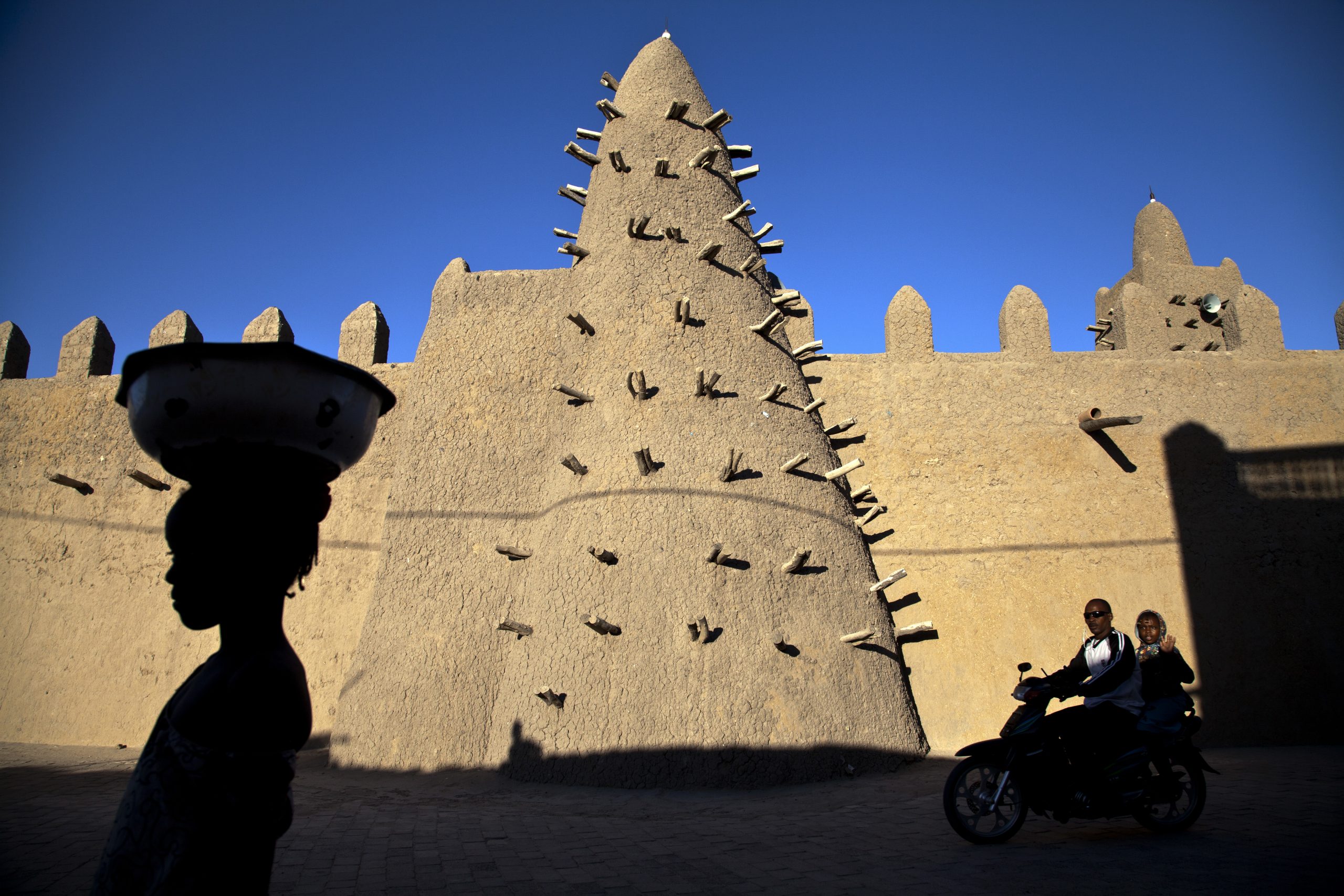28 Sub-Saharan Africa: Cultural Geography I – Cousinage in Mali
As written by Elise Willeau, international conflict management consultant.
“A canoe does not know who the leader is; when it turns over, everyone gets wet.”
– traditional Malian proverb
The Republic of Mali is a landlocked country right in the heart of West Africa. Covering 1,240,192 square kilometers, Mali is more than twice the size of Texas. As noted in our coverage of North Africa and the Middle East (NAME), Mali straddles the key division of Africa where the Sahara Desert transitions to the aptly named Sub-Saharan Africa. The northern two-thirds of the country is considered in the Sahara Desert, leaving most of the population in the hospitable southern third of the country, mainly grouped in towns and cities along the Niger River. Today’s chapter deals with people and culture in Mali, so we will place the chapter in our textbook’s section on Sub-Saharan Africa.
Mali is home to twenty million people, but this population is divided into more than ten ethnic groups. This diversity is also displayed by the use of more than a dozen local languages and dialects. Due to colonial days, Mali’s official language is French.
| Ethnic Group | Percentage of Mali's population |
|---|---|
| Bambara | 33 |
| Fulani | 13 |
| Sarakole/Soninke/Marka | 10 |
| Senufo/Manianka | 10 |
| Malinke | 9 |
| Dogon | 9 |
| Sonrai | 6 |
| Other | 10 |
Despite the number of diverse cultures and languages, until quite recently Mali was considered a beacon of hope for peace and democracy on the continent of Africa. Mali received its independence from France on September 22, 1960. In the following decades many other newly independent countries in the region fell victim to frequent instability, routine coup d’etats, and civil wars. In contrast, Mali routinely enjoyed relative peace, especially significant considering that Mali is regularly found to be one of the poorest countries in the world. So how did Mali remain so peaceful? Locals often attribute a great deal of that peace to a special relationship between cousin ethnic groups, a phenomenon called “cousinage à plaisanterie.” In English, we say “exchange pleasantries” to mean “make polite small talk.” Although the French word plaisanterie looks similar to the English pleasantries, in Mali this concept of cousinage à plaisanterie is much more powerful and includes a noteworthy humorously joking twist. Joking cousins!
In its most general definition, cousinage refers to a kinship between cousins. In Mali, however, this kinship goes beyond blood relatives and extends to link ethnic groups and families. Dating back in oral history traditions to the time of the great Sundiata Keita (Mali’s epic emperor of the 13th century), these ties of honor between families and ethnic groups solidified alliances and follow a simple code.
- Don’t get angry at your joking cousin.
- If your joking cousins ask you to do something, then do it.
- Do no harm to your joking cousins.
In practice, this cousinage (in Mali the concept is called sinankunya, which can be spelled differently depending on the local language) manifests itself as a joking relationship. Linked groups regularly exchange insults in jest. From an outsider’s perspective, the joking relationship has no limits in place or level of intimacy. For example, there is special relationship between the family Diarra and the family Traoré. A Diarra upon meeting a Traoré for the first time might suggest that he eats a lot of beans, suggesting of course that the Traoré breaks wind (an act absolutely prohibited in polite Malian society). The Traoré might then retort that it is, in fact, the Diarra that eats the beans, at which point everyone laughs.
For a westerner, these joking relationships may seem strange or even crass, but in practice the links between families and ethnic groups serve as an important informal network of mediators and go-betweens across the country. In the bustling marketplace in Bamako, Mali’s capital city, it isn’t uncommon for disputes to be settled with the help of a random passerby who happens to share a cousinage alliance with the disputants. The joking aspect of the interactions can easily diffuse tension. These alliances are also important in the matters of family conflict. Again, neighbors who share a cousinage alliance in the family have the legitimacy to intervene in family conflict and even to solve conflict because according to the code, the family must do whatever the joking cousin asks. This may even be a surprising concession – for example, allowing a pregnant unmarried daughter (also frowned upon in polite Malian society) to return home.
Today the prevailing question is a serious matter. How can the presence and commitment to the cousinage à plaisanterie help Mali return to peace? Growing tension between the government and the Tuaregs in northern Mali, plus the influx of resources and people supporting Islamic fundamentalism, broke Mali’s stability, tipping it into outright violence and even a coup in 2012- 2013. Over the last ten years Mali has suffered both from random acts of violence and from stagnant peace processes. A coup in August 2020 led to the resignation of President Ibrahim Boubacar Keita. This is yet another in a mounting list of acts further destabilizing the country.
Balla Fasséké, griot to the first emperor of Mali, is reported to have said “Prevention is better than cure.” While true, it’s going to take a great deal of beans to get Mali back on track.
Did You Know?
My Turn!
CITED AND ADDITIONAL BIBLIOGRAPHY:
“Mali.” In The World Factbook. Central Intelligence Agency, December 14, 2021. https://www.cia.gov/the-world-factbook/countries/mali/.
“Malian Proverbs.” https://proverbicals.com/malian.
Payne, Rodger. “Joking Cousins.” The Duck of Minerva (blog), June 19, 2009. https://www.duckofminerva.com/2009/06/joking-coursins.html.
United Nations. Djingareyber Mosque, Timbuktu. December 5, 2013. Photo. https://www.flickr.com/photos/un_photo/15589474411/. Attribution-NonCommercial-NoDerivs 2.0 Generic (CC BY-NC-ND 2.0).




